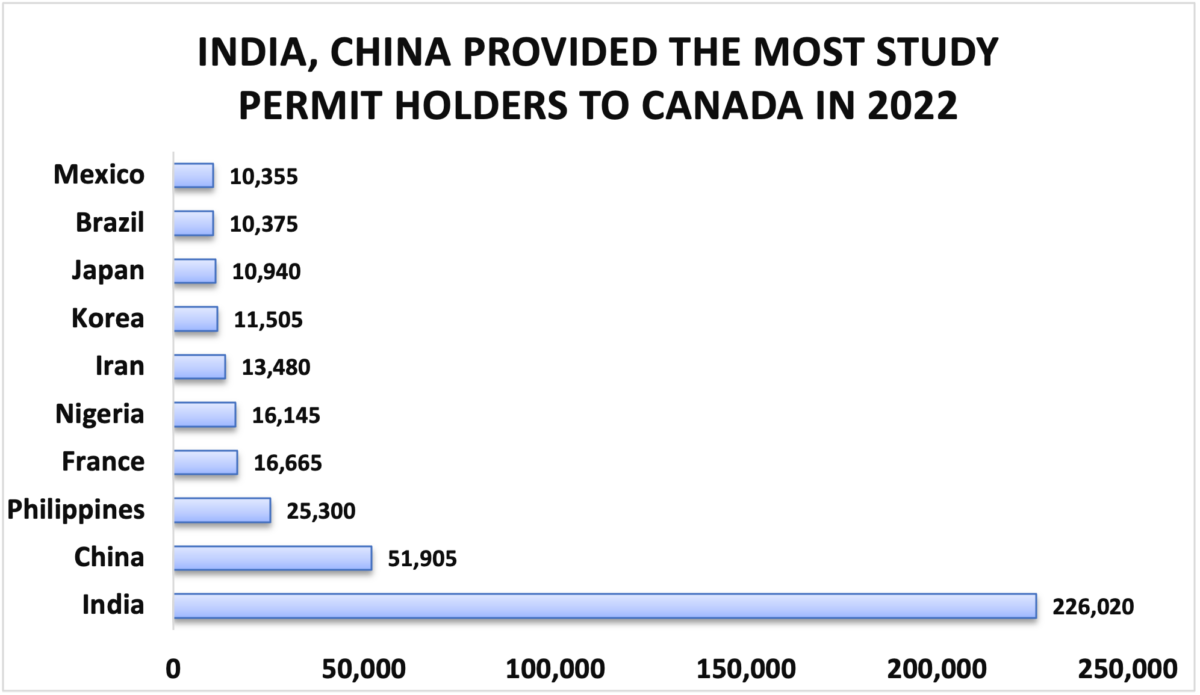
The number of international students in Canada – foreign nationals who hold study permits – is on track to hit one million by the end of this year.
The latest data from Immigration, Refugees and Citizenship Canada (IRCC) reveals there were 807,260 study permit holders in Canada on Dec. 31 last year, up almost 30.8 per cent from the 617,250 study permit holders in 2021.
Since then, the IRCC has issued 201,155 study permits in the first five months of this year, or almost 20.4 per cent more than in the comparable period last year.
“Studying in Canada is a wonderful student experience,” notes Yocket, an online platform for students seeking to study abroad.
“Canada welcomes immigrants and provides them with benefits without much ado. So, if you are keen on studying in Canada, you can choose one of the best student cities in Canada and apply. After your graduation, you can live by getting a Post-Graduation Work Permit (PGWP) in Canada.”
Read More Canada Immigration News
International Student In Canada: How To Extend Your Study Permit
International Students In Canada: How To Change Schools
Genuine Canada International Students In Fake Acceptance Letters Scandal Will Not Be Deported
The education gleaned from Canadian universities is consistently ranked as among the best in the world.
Three Canadian universities, the University of Toronto (UofT), the University of British Columbia (UBC), and McGill University, were deemed last year to be among the 100 best in the world in the ninth annual Best Global Universities rankings. Another 15 Canadian universities made it into the top quarter of the 2,000 universities ranked.
Before an international student even steps onto the plane – or boat or car or bus – to come to Canada to study, he or she should have a basic understanding of the educational system here.
Study Permit Applicants Need To Be Accepted To A DLI
In Canada, each of the 10 provinces and three territories runs its own educational system and so a good way to get information about schools in each of those provinces and territories is by contacting the individual education ministries.
The Canadian Information Centre for International Credentials offers up all the contact information for each such ministry.
Another good source of information about schools and educational systems in Canada is EduCanada, the federal government’s website for international students looking to study in Canada. It helps international students search for study programs, get cost estimates, apply for scholarships and plan their lives in Canada.
Canada generally has primary schools for students up to Grade 6, then middle schools for Grades 7 and 8, and secondary schools for Grades 9 through to 12. This varies somewhat from province to province.
After secondary school, students in Canada can go to:
- colleges;
- universities;
- private career colleges, or;
- vocational and technical schools.
“Each post-secondary school has its own set of rules on how to apply, including the level of English or French you need to be accepted,” notes Immigration, Refugees and Citizenship Canada (IRCC) on its website.
Perhaps one of the most important things an international student has to know is that the school to which they are applying must be a Designated Learning Institution (DLI) for their study permit to be accepted.
These DLIs are schools approved by the provinces and territories to enrol international students and automatically include all primary and secondary schools in Canada.
International students can search a list of the post-secondary schools, such as colleges and universities, and language schools that are DLIs in each province and territory on the federal government’s website here.
Since many international students want to work in Canada upon graduation with a PGWP, it is important for them to know before they start their studies that not all DLIs and programs make them eligible for this work permit.
Changes To PGWP-Eligible DLIs In Quebec Coming In September
“Along with graduating from a PGWP-eligible designated learning institution, you need to meet all other criteria to get a post-graduation work permit,” notes the IRCC.
Every so often there are changes to the eligibility requirements for the PGWP, such as those which are to take effect this coming school year for some programs at DLIs in Quebec. Those changes do not affect those who will have completed their programs by Sept. 1 this year.
But those who began their programs after that date will only be able to apply for a PGWP if they graduate from a subsidized program of study that remains eligible for the PGWP after Sept. 1, 2023.
“If you are studying in a program that will no longer be eligible for the PGWP after Sept. 1, 2023, the time you spent studying in the program prior to that date may be counted towards a PGWP in the future,” notes the IRCC.
Video
Once an international student has chosen a school, college or university, they must apply to go there and follow that school’s admission requirements. The admission fees can vary considerably from one school to another.
“Application fees for universities in Canada range between $50 to $250,” notes Yocket. “These are non-refundable fees which means if you are not selected, or you do not wish to confirm your offer at a particular college, you will not recover the application fee once paid.”
Canadian immigration officials suggest applying at least six months in advance to study at a primary or secondary school and one year in advance for a post-secondary program at a university or college.
“Contact the school where you want to study to learn how to apply,” notes the IRCC. “They’ll give you the list of all the documents you need to send them. They’ll also be able to tell you about: the cost to apply; tuition fees; health insurance; rent and how much it costs to live in Canada, and; language tests.”
Schools in Canada send international students acceptance letters once they have been admitted and that letter is a very important part of the application process for a study permit.
It’s at the point that a college or university has accepted an international student that he or she should apply for a study permit.
That is usually done online but those who suffer from a disability or some other barrier that prevents them from applying online or makes applying online unreliable can be exempted from this requirement and submit a paper application.
International students applying to a school in Quebec, will also receive, along with their acceptance letter, a Certificat d’Acceptation du Québec (CAQ) and must include this document in their study permit applications.
International Students Urged To Get Adequate Health Insurance
International students are responsible for their own healthcare costs as neither Canada nor the provinces pay for the medical costs of foreign students. Health coverage for foreign students varies between provinces.
It is very important for international students to ensure they have adequate medical and health insurance and can in an emergency situation pay those costs up front as many clinics and hospitals will insist on those payments being made upon treatment and insurance companies may only reimburse those costs later.
International students are advised to contact their schools to get more information about medical coverage and health insurance.
In order to successfully gain entry into Canada under the Student Direct Stream (SDS), every international student will also have to prove proficiency in English or French.
The International English Language Testing System (IELTS) is the preferred test for proficiency in English and students must score 6.0 or higher in each language skill: listening, reading and speaking.
For francophone students, a Test d’Évaluation de Français (TEF) score that is equivalent to a Canadian Language Benchmarks (CLB) score of at least seven for each ability is required.



